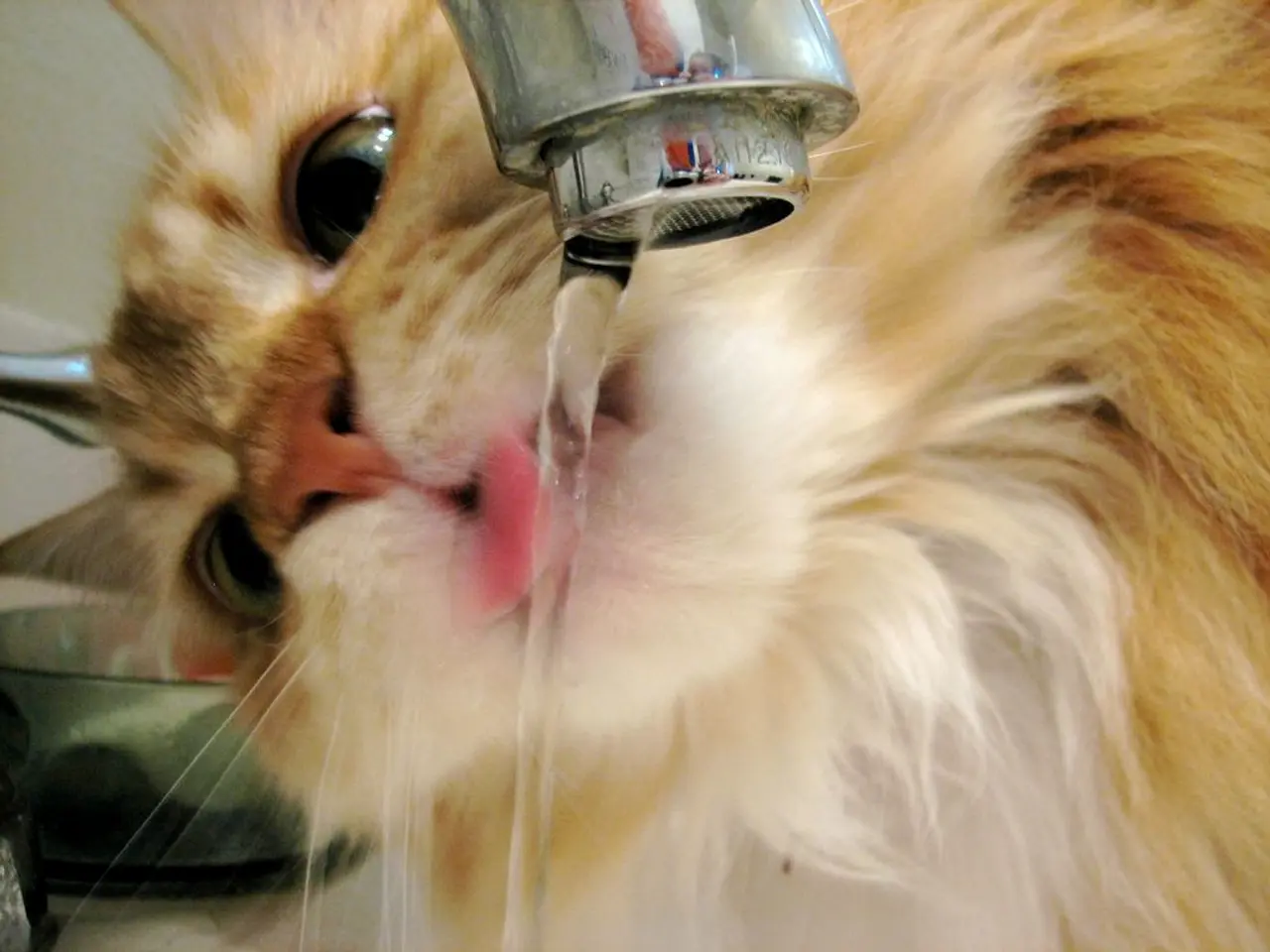Kittens' Water Consumption: Insights from a Veterinary Perspective
**Sub-title:** Proper water intake for kittens can significantly impact their overall health and wellbeing. Here's how to ensure your little feline friend stays hydrated.
As any cat owner knows, kittens can be a bundle of energy and curiosity. But did you know that their water intake needs are just as important as their diet and exercise? In this article, we'll delve into the factors that influence a kitten's water intake, the importance of hydration, and tips for maintaining a healthy water supply for your feline friend.
First, let's explore the impact of age on a kitten's water intake. Newborn kittens don't require additional water as they get all their hydration from their mother's milk. However, by around 4 to 6 weeks, kittens start needing supplemental water as their mother’s milk alone isn't enough. From 6 to 12 weeks, kittens typically drink 60–100 ml of water per kg of body weight daily. As they grow, kittens usually require around ½ cup of water per day per 5 pounds (2.27 kg) of body weight, which translates to about ¼ cup daily for a 2.5-pound kitten.
Diet plays a significant role in a kitten's water intake as well. Kittens consuming mostly wet food drink less water from their bowls because wet food contains 70–80% water. On the other hand, those eating primarily dry food tend to drink more water since dry food contains minimal moisture. Adding a little water to wet food can help increase hydration if needed.
Environment and activity level also impact a kitten's water needs. More active or outdoor kittens may have higher water needs due to increased calorie burn. Kittens kept in confined spaces may benefit from spill-proof bowls or drinking fountains to encourage proper hydration. It's essential to keep water bowls separate from food and litter trays, as cats prefer distinct drinking areas.
Proper hydration supports kidney and urinary health and overall wellbeing. Signs of dehydration, such as weakness or lack of appetite, require immediate veterinary attention. Dehydration in kittens can be life-threatening and should be recognized by signs such as sunken eyes, loss of skin elasticity, and dry gums.
Providing constant access to fresh, clean water adjusted for these factors ensures your kitten stays properly hydrated and healthy. Monitoring a kitten's drinking habits and body language is important for their health. Shallow ceramic or glass bowls are best for kittens, as some dislike the smell or taste of plastic.
If crate-training or confining a kitten overnight, ensure water is available in a spill-proof bowl. For very young or clumsy kittens, use a sturdy, shallow dish to avoid spills or tipping. Water bowls should be cleaned ideally daily and topped up with fresh water at least once a day. Always consult a vet if you're ever unsure about your kitten's drinking habits or health.
Many cats, including kittens, prefer running water, such as from a pet fountain. Establishing good drinking habits early in a kitten's life helps support kidney and urinary health later on. A kitten's access to fresh, clean water should be available at all times, including overnight.
Placing several water bowls around the house can encourage kittens to drink more water. As your kitten grows and their water intake needs change, adjust the water supply accordingly to ensure they stay healthy and hydrated. With the right care and attention, your kitten will be purring with happiness in no time!
- Kittens, just like cats and dogs, require proper training on their health and lifestyle needs, including ensuring they have access to fresh water.
- As kittens grow, their water intake requirements change, with newborn kittens getting hydration from their mother's milk and older kittens requiring supplemental water.
- Diet plays a significant role in a kitten's water intake, with those eating wet food drinking less due to the high content of water in wet food.
- Environment and activity level also impact a kitten's water needs, with more active or outdoor kittens requiring more water due to increased calorie burn.
- Proper hydration supports not only a kitten's kidney and urinary health but also their overall wellbeing, and signs of dehydration such as weakness or lack of appetite are cause for immediate veterinary attention.
- Shallow ceramic or glass bowls are best for kittens, as some dislike the smell or taste of plastic, and it's important to keep water bowls separate from food and litter trays.
- With the right care, including providing constant access to fresh, clean water, a kitten's access to fashion-and-beauty products, home-and-garden decor, and toys can contribute to their overall happiness and wellbeing.



